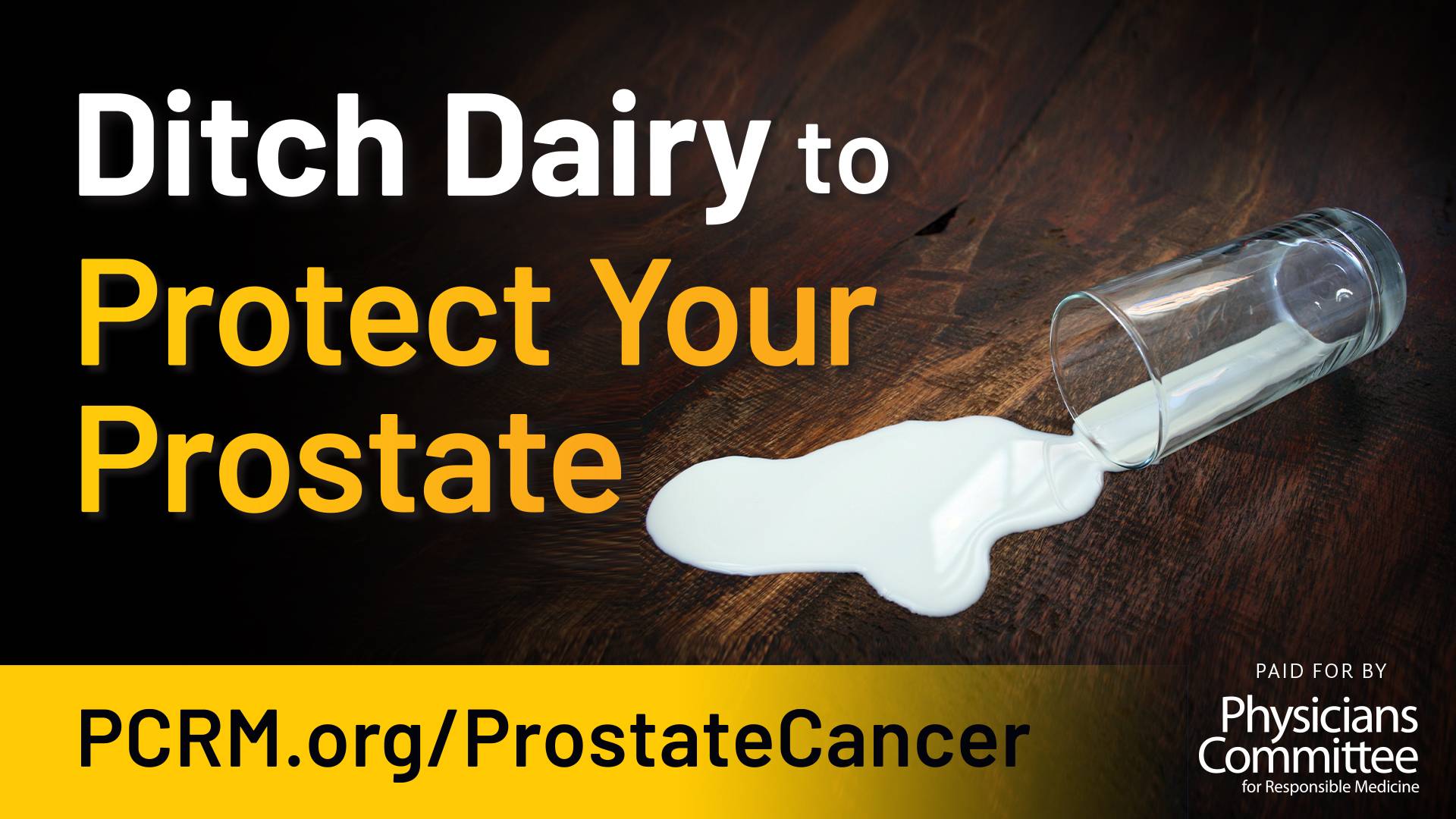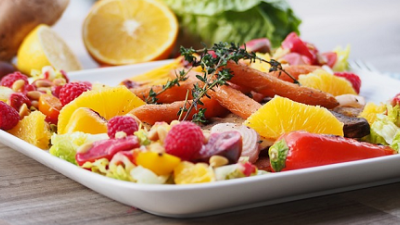Prostate Cancer
Protect Against Prostate Cancer With a Plant-Based Diet
A plant-based diet that avoids meat and dairy products can help protect against prostate cancer.
Prostate cancer is the most common cancer in men in the United States, according to the American Cancer Society’s 2024 annual report, as well as the second most common cause of cancer deaths.1 Prostate cancer disproportionately affects Black men, who are more likely to get prostate cancer and are more than twice as likely to die from prostate cancer than other men.2
Ditch the Dairy
High intakes of dairy products including whole and low-fat milk and cheese increase the risk for prostate cancer, according to a 2015 meta-analysis in the American Journal of Clinical Nutrition.3 Previous research found that men drinking more than one glass of whole milk per day had double the risk for fatal prostate cancer, compared with men drinking less.4
Whole milk consumption also increases risk for prostate cancer recurrence in overweight and obese men, according to a 2018 study.5 Those who consumed more than four servings of whole milk per week increased their risk for recurrence by 73%, compared to those who consumed fewer or no servings of milk.
It isn’t just the dairy fat that is associated with prostate cancer risk, low-fat milk products also increased risk. In a 2013 study, those who had one or more servings a day of skim/low-fat milk had a 19% increased risk of prostate cancer, compared with those who rarely consumed it.4 The first National Health and Nutrition Examination Epidemiologic Follow-up Study followed 3,612 men for 8-10 years, Compared with men who had the lowest dairy intake, those in consuming the most low-fat dairy had a higher risk for developing prostate cancer.6 Dairy products also increase the risk of death from prostate cancer, according to a study published in the International Journal of Cancer. Men who consumed three or more servings of dairy products a day had a 141% higher risk for death due to prostate cancer compared to those who consumed less than one serving.7 Both high- and low-fat dairy products were associated with increased mortality.
Soy milk is rich and creamy and a great alternative to dairy. Not only does it taste delicious, but the Adventist Health Study found that drinking soy milk every day was associated with a reduced risk of prostate cancer.8
Reduce Red and Processed Meat and Eggs
Red and processed meats are also associated with an increased risk of prostate cancer. A study looking at nearly 2 million men and over 35,000 new prostate cancer diagnoses found that consuming processed meat was linked to an increased risk of both total and advanced prostate cancer.9 Another study found that compared to eating less half an egg per week, men consuming two and a half eggs per week or more had an 81% increased risk of prostate cancer death.10
Prevent With a Plant-Based Diet
The Adventist Health Study-2 found that men who followed a vegan diet had a 35% lower prostate cancer risk than those following a nonvegetarian, lacto-ovo-vegetarian, pesco-vegetarian, or semi-vegetarian diet, although this relationship was stronger in white men.11 Beans appear to be an especially good source of protein for men, as a meta-analysis published in 2015 found that the more beans men ate, the lower their risk of prostate cancer was.12
Protect With a Plant-Based Diet
The Prostate Cancer Lifestyle Trial was a randomized controlled trial that involved a low-fat plant-based diet, exercise, and stress management. After two years of follow-up, 27% of the control group required some form of conventional prostate cancer treatment compared to only 5% of the intervention group.13
Men who consume the most plant-based foods decrease their risk of dying from prostate cancer by 19%, according to an abstract published in The Journal of Urology.14 And men who were encouraged to eat a plant-based diet reduced the rise in their PSA levels, which is a blood marker of disease progression.15,16
A study of over 2,000 men with prostate cancer found that those who ate the most plant-based foods had a 56% lower risk of prostate cancer progression and a 59% lower risk of prostate cancer recurrence compared to those who ate the least.17
A plant-based diet can also improve the quality of life in men who have been diagnosed with prostate cancer. The Health Professionals Follow-up Study looked at over 3,500 men with nonmetastatic prostate cancer between 1986-2016.18 It found that those who ate the most plant-based foods had an improved quality of life, including sexual function, urinary irritation/obstruction, and urinary frequency.
The great news about a plant-based diet is that it’s not only beneficial for prostate cancer, but also for other types of cancer, type 2 diabetes, heart disease, high blood pressure, and more.
The Role of Exercise
Physical exercise can be beneficial for health, even after a diagnosis of prostate cancer. The Health Professionals Follow-Up Study found that men with prostate cancer who got more regular exercise had a lower risk of death than those who exercised less. For example, men who walked ≥ 90 minutes per week had a 46% lower risk of dying from all causes.19 Physical exercise may also improve physical functioning and strength in men with prostate cancer that has spread to the bones.20
Plant-Powered Prescription
- Replace dairy with soy-based alternatives.
- Eliminate processed meat and eggs – instead get your protein from tofu, beans, and whole grains.
- Eat one serving of soy food each day, such as half a glass of soy milk or half to a one cup of tofu.
- Eat half a cup of beans every day.
Wipe away those milky moustaches and ditch dairy today to reduce your risk of prostate cancer. Soy milk is not only a delicious alternative, but it may also reduce the risk of prostate cancer.
Dr Roxanne Becker, MBChB, DipIBLM, Medical Editor and Educator, Physicians Committee
A Plant-Powered Approach To Prostate Cancer
Further Reading
Your Body in Balance
Read about the science behind food, hormones, and health in Dr. Barnard’s new book!
References
- Dizon DS, Kamal AH. Cancer statistics 2024: All hands on deck. CA Cancer J Clin. 2024. doi:10.3322/caac.21824
- Centers for Disease Control and Prevention. Who Is at Risk for Prostate Cancer? Updated July 17, 2023. Accessed April 22, 2024. https://www.cdc.gov/cancer/prostate/basic_info/risk_factors.htm
- Aune D, Navarro Rosenblatt DA, Chan DS, et al. Dairy products, calcium, and prostate cancer risk: a systematic review and meta-analysis of cohort studies. Am J Clin Nutr. 2015;101(1):87-117. doi:10.3945/ajcn.113.067157
- Song Y, Chavarro JE, Cao Y, et al. Whole milk intake is associated with prostate cancer-specific mortality among U.S. male physicians. J Nutr. 2013;143(2):189-196. doi:10.3945/jn.112.168484
- Tat D, Kenfield SA, Cowan JE, et al. Milk and other dairy foods in relation to prostate cancer recurrence: data from the cancer of the prostate strategic urologic research endeavor (CaPSURE™). Prostate. 2018;78(1):32-39. doi:10.1002/pros.23441
- Tseng M, Breslow RA, Graubard BI, Ziegler RG. Dairy, calcium, and vitamin D intakes and prostate cancer risk in the National Health and Nutrition Examination Epidemiologic Follow-up Study cohort. Am J Clin Nutr. 2005;81(5):1147–1154. doi:10.1093/ajcn/81.5.1147
- Yang M, Kenfield SA, Van Blarigan EL, et al. Dairy intake after prostate cancer diagnosis in relation to disease-specific and total mortality. Int J Cancer. 2015;137(10):2462-2469. doi:10.1002/ijc.29608
- Jacobsen BK, Knutsen SF, Fraser GE. Does high soy milk intake reduce prostate cancer incidence? The Adventist Health Study (United States). Cancer Causes Control. 1998;9(6):553-557. doi:10.1023/a:1008819500080
- Nouri-Majd S, Salari-Moghaddam A, Aminianfar A, Larijani B, Esmaillzadeh A. Association between red and processed meat consumption and risk of prostate cancer: a systematic review and meta-analysis. Front Nutr. 2022;9:801722. doi:10.3389/fnut.2022.801722
- Richman EL, Kenfield SA, Stampfer MJ, Giovannucci EL, Chan JM. Egg, red meat, and poultry intake and risk of lethal prostate cancer in the prostate-specific antigen-era: incidence and survival. Cancer Prev Res (Phila). 2011;4(12):2110-2121. doi:10.1158/1940-6207.CAPR-11-0354
- Tantamango-Bartley Y, Knutsen SF, Knutsen R, et al. Are strict vegetarians protected against prostate cancer? Am J Clin Nutr. 2016;103(1):153-160. doi:10.3945/ajcn.114.106450
- Li J, Mao QQ. Legume intake and risk of prostate cancer: a meta-analysis of prospective cohort studies. Oncotarget. 2017;8(27):44776-44784. doi:10.18632/oncotarget.16794
- Frattaroli J, Weidner G, Dnistrian AM, et al. Clinical events in prostate cancer lifestyle trial: results from two years of follow-up. Urology. 2008;72(6):1319-1323. doi:10.1016/j.urology.2008.04.050
- Loeb S, Fu BC, Bauer SR, et al. MP32-06 Association of plant-based dietary patterns with prostate cancer risk. J Urol. 2021. doi:10.1097/JU.0000000000002036.06
- 15. Nguyen JY, Major JM, Knott CJ, Freeman KM, Downs TM, Saxe GA. Adoption of a plant-based diet by patients with recurrent prostate cancer. Integr Cancer Ther. 2006;5(3):214-223. doi:10.1177/1534735406292053
- Saxe GA, Major JM, Nguyen JY, Freeman KM, Downs TM, Salem CE. Potential attenuation of disease progression in recurrent prostate cancer with plant-based diet and stress reduction. Integr Cancer Ther. 2006;5(3):206-213. doi:10.1177/1534735406292042
- Liu VN, Van Blarigan EL, Zhang L, et al. Associations between plant-based diets and risk of disease progression in men with prostate cancer. J Clin Oncol. 2023;41(6). doi:10.1200/JCO.2023.41.6_suppl.392
- Loeb S, Hua Q, Bauer S, et al. Plant-based diet associated with better quality of life in prostate cancer survivors. Cancer. 2024. doi:10.1002/cncr.35172
- Kenfield SA, Stampfer MJ, Giovannucci E, Chan JM. Physical activity and survival after prostate cancer diagnosis in the health professionals follow-up study. J Clin Oncol. 2011;29(6):726-732. doi:10.1200/JCO.2010.31.5226
- Galvão DA, Taaffe DR, Spry N, et al. Exercise preserves physical function in prostate cancer patients with bone metastases. Med Sci Sports Exerc. 2018;50(3):393-399. doi:10.1249/MSS.0000000000001454









